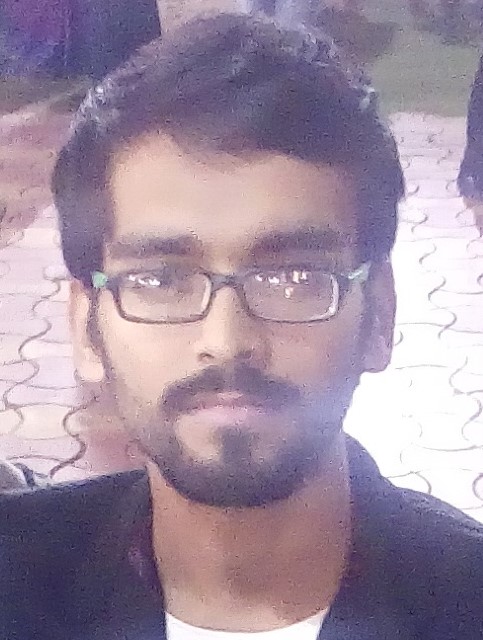CReWMaN Seminar Series
Friday, 11 am CDT
Zoom Link: https://umsystem.zoom.us/j/95915777679?pwd=R2wySkdzS0gwazhielVNSkUwR0hoQT09&from=addon
CReWMaN
Seminar Details

Title: Early classification approaches for multivariate time series
Speaker: Dr. Ashish Gupta, Missouri University of Science and Technology
Date: Aug 27, 2021
Abstract:
In this presentation, Dr. Gupta will discuss his research findings on the early classification of Multivariate Time Series (MTS) generated from sensors. Early classification is mainly an extension of traditional classification with an ability to classify an MTS with a limited number of data points. One can achieve better accuracy by using more data points, but the earliness may be reduced. It is a well-studied topic for minimizing class prediction delay in various applications, including human activity recognition, gene expression-based health diagnostic, and industrial process monitoring.
An early classification approach may encounter the following significant problems: (1) MTS with different length components generated from the sensors of different sampling rates, (2) MTS with unreliable components, and (3) MTS belonging to an unseen class label for which there exists no instance in the training dataset. Solution strategies along with real-world applications will be discussed.
Bio:
Dr. Ashish Gupta is a Post Doctoral Fellow working under the guidance of Prof. Sajal K. Das in the Computer Science department at Missouri S&T, Rolla, US. He received the Ph.D. degree in Computer Science and Engineering from Indian Institute of Technology (BHU), Varanasi, India, in 2020. While pursuing Ph.D., his work primarily focused on developing Early Classification algorithms for sequential/time series data. His research interests include sensor data analytics, applied machine learning, and federated learning.

Title: LSTM Network with log-sigmoid Activation Family for Time Series Data Classification
Speaker: Priyesh Ranjan, Missouri University of Science and Technology
Date: Sep 3, 2021
Abstract:
In spite of the growing interest in artificial intelligence (AI)-based computational techniques, it is extremely challenging to improve the accuracy of data classification models, particularly in the healthcare domain, while trading off the complexity. In this paper, we address the classification of time series data using the Long Short-Term Memory (LSTM) network. Specifically, we propose a new family of activation functions, called log-sigmoid, inside the LSTM cell for time series data classification, and analyze its properties. We also present the use of a linear transformation (e.g., log-tanh) of the proposed log-sigmoid activation as a replacement of the traditional hard-sigmoid function in the LSTM cell. Finally, we report a comparative performance analysis of the LSTM model using the proposed activation functions with state-of-the-art neural network architectures.
Bio:
Priyesh Ranjan received BTech in electrical engineering from the Indian Institute of Technology Patna in 2021.
He is currently pursuing a Ph.D. degree in computer science at Missouri S&T.
His research interests are in machine learning, deep learning, and time-series data analysis.
Title: Framing Effects on Strategic Information Design under Receiver Distrust and Unknown State
Speaker: Meredith Doris Brown, Missouri University of Science and Technology
Date: Sep 10, 2021
Abstract:
Strategic Information Design is a framework where a sender designs information strategically to steer its receiver's decision towards a desired choice. Traditionally, such frameworks have always assumed that the sender and the receiver comprehends the state of the choice environment, and that the receiver always trusts the sender's signal. This paper deviates from these assumptions and re-investigates strategic information design in the presence of distrustful receiver and when both sender and receiver cannot observe/comprehend the environment state space. Specifically, we assume that both sender and receiver has access to non-identical beliefs about choice rewards (with sender's belief being more accurate), but not the environment state that determines these rewards. Furthermore, given that the receiver does not trust the sender, we also assume that the receiver updates its prior in a non-Bayesian manner. We evaluate the Stackelberg equilibrium and investigate effects of information framing (i.e. send complete signal, or just expected value of the signal) on the equilibrium. Furthermore, we also investigate trust dynamics at the receiver, under the assumption that the receiver minimizes regret in hindsight. Simulation results are presented to illustrate signaling effects and trust dynamics in strategic information design.
Bio:
Doris Brown is a first year PhD student at Missouri S&T. She received her BS in Computer Science from the University of Tennessee at Martin. Her research areas include trust, persuasion, and strategic information transmission.
Title: VRank: A New Algorithm to Compute the Influence of Users and Posts in Online Social Networks
Speaker: Arindam Pal
Date: Sep 17, 2021
Abstract: Assigning scores to the vertices of a graph and ranking them based on this score is a fundamental problem in online social networks (OSN). We model the problem of computing the influence of users and the importance of their posts in OSNs as an iterative computation on an interdependent graph. We develop a new algorithm VRank to compute the scores of users and posts. We prove that the algorithm eventually converges to the principal eigenvectors of certain matrices associated with the underlying graph. The algorithm runs very fast, as shown by the time-complexity analysis for each iteration. We also show that our algorithm converges rapidly, and the speed of convergence depends on the second-largest eigenvalue of some matrix.
We study it under a regularization framework to show that the regularization function is strictly convex, and it has only one global minimum, which is precisely the solution given by our algorithm. We also give a Bayesian explanation of our method, based on a probabilistic graphical model, thus showing the equivalence between the two approaches. We generalize our bipartite graph ranking algorithm to rank vertices of heterogeneous, multiplex n-partite graphs. We do extensive experiments on real-world OSNs and validate the effectiveness of our algorithm against the current state-of-the-art algorithms. The experimental results demonstrate VRank's effectiveness, efficiency and fast convergence.
Bio: Arindam Pal is a Senior Research Scientist at Data61 in Commonwealth Scientific and Industrial Research Organisation (CSIRO), and a Senior Research Fellow at Cyber Security Cooperative Research Centre (CSCRC). He is also a Conjoint Senior Lecturer in the School of Computer Science and Engineering at UNSW Sydney. His research interests are in Artificial Intelligence, Cyber Security and Machine Learning. He works on business and research problems of CSIRO, and collaborates with faculty members of universities, both in Australia and abroad. He earned his PhD in Computer Science from Indian Institute of Technology Delhi. He has over 14 years of industrial research experience in software companies like Microsoft, Yahoo!, and Novell. He has published academic papers in reputed conferences and journals, and filed patents in various countries like India, USA, and Europe. He is a technical program member for several reputed conferences and technical reviewer for many renowned journals. He is a Senior Member of both ACM and IEEE.
Title: Efficient Route Selection for Drone-based Delivery Under Time-varying Dynamics
Speaker: Arindam Khanda
Date: Sep 24, 2021
Abstract: The use of drones or Unmanned Aerial Vehicles (UAV) can be efficiently employed for delivering items in time-critical situations when there is a traffic jam on the roads, to serve customers in hard-to-reach places, or simply to expand the business.
However, due to limited battery capacities and the fact that drones can serve a single customer at a time, a drone-based delivery system (DBDS) aims to minimize the drones' energy usage for completing a route from the depot to the customer and go back to the depot for new deliveries. In general, the shortest delivery route could not be the optimal choice since external factors like the wind (which varies with time) can affect energy consumption.
Previous work has mainly considered simplified DBDSs assuming architectures with a single drone and with static costs on paths. Moreover, in these non-centralized architectures, the drones themselves compute the routes on the fly employing their onboard processing resources, making this choice costly.
In this presentation, I will talk about a centralized system for computing energy-efficient time-varying routes for drones in a multi-depot multi-drone delivery system. Specifically, I will present a novel centralized parallel algorithm that, over time, updates the drones' delivery routes avoiding the whole recomputation from scratch.
Bio: Arindam Khanda received the BTech degree in ECE from Institute of Engineering and Management and the MTech degree in Software Systems from BITS Pilani in 2015 and 2019, respectively. He is working toward the PhD degree at the Missouri University of Science and Technology. His research interests include parallel programming models, dynamic graphs, and HPC.
Title: Obstacle-Aware and Energy-Efficient Multi-Drone Coordination and Networking for Disaster Response
Speaker: Chengyi Qu
Date: Oct 08, 2021
Abstract: Unmanned aerial vehicles or drones provide new capabilities for disaster response management (DRM). In a DRM scenario, multiple heterogeneous drones collaboratively work together forming a flying ad-hoc network (FANET) instantiated by a ground control station. However, FANET air-to-air and air-to-ground links that serve critical application expectations can be impacted by: (i) environmental obstacles, and (ii) limited battery capacities. In this presentation, we present a novel obstacle-aware and energy-efficient multi-drone coordination and networking scheme that features a Reinforcement Learning (RL) based location prediction algorithm coupled with a packet forwarding algorithm for drone-to-ground network establishment. Results show that our strategy overcomes obstacles and can achieve between 81-90% of network connectivity performance observed under no obstacle conditions. With obstacles, our scheme improves network connectivity performance by 14- 38% while also providing 23-54% of energy savings.
Bio: Chengyi Qu received his B.S degree from the Department of Software Engineering at Northeast University, China. He is currently a Ph.D. student in the Department of Electrical Engineering and Computer Science at the University of Missouri-Columbia, USA. His current research interests include distributed and cloud computing, edge computing, routing protocols, and drone-aided video analytics.

Title: Smart Integrated Farm Network for Rural Agricultural Communities
Speaker: Kevin Menke
Date: Oct 15, 2021
Abstract: I will provide an overview of the SIRAC project (Smart Integrated Farm Network for Rural Agricultural Communities) and then cover the requirements and overall design approach I plan to use to build a Smart Insect System that will identify and count predatory insects. I will focus on the Convolutional Neural Network used for identifying objects in a 2D image.
Bio: I obtained a BSEE from University of Missouri – Rolla and a MSEE from Stanford University. I am currently working on a PhD in Computer Science at Missouri University of Science and Technology. I worked 42 years in Telecommunications, Medical Electronics and Automated Trading Systems. I have worked in many different roles including software development, hardware development, system and product architecture, systems engineering, technical marketing, tool development, quality improvements, technical project management, and a technical manager. I enjoy challenging projects and working with new emerging technologies.
Title: Robustness against Attacks and Uncertainties in Smart Cyber-Physical Systems
Speaker: Prithwiraj Roy
Date: Oct 22, 2021
Abstract: Cyber-physical systems (CPS) comprise the backbone of critical infrastructures of a smart city such as power grids, transportation systems, mobile crowdsensing, medical devices, etc. Such CPS systems, generally termed as smart CPS is considered as the next generation of systems that integrate sensing, communication, computation, and control to achieve stability, high performance, robustness, and efficiency. Security challenges in CPS necessitate solutions that are robust to attacks and uncertainties and provide a seamless operation, especially when used in real-time applications to monitor and secure critical infrastructures. In this talk, I concentrate on three aspects of CPS robustness and security. First, we investigate the security of smart grid systems against adversarial attacks and how reliable automation of smart grids depends on decisions based on situational awareness extracted via real-time system monitoring and accurate state estimation. Then, we take a crowdsourcing vehicular network environment to identify potential security concerns specifically that impacts the quantification of the aggregate truthfulness of sensed data (quality of information (QoI)). Finally, we generalize the CPS system by creating a large-scale network to investigate how information propagates in the network and possible ways to control and mitigate the flow of information.
Bio: Prithwiraj Roy is a PhD student working as a Graduate Research Assistant at the Missouri University of Science and Technology, Rolla. He received his BE from Indian Institute of Engineering Science and Technology, Shibpur. His current research is focused on the security and robustness of smart cyber-physical systems such as smart grid applications, Mobile Crowd-Sensing systems (MCS), and complex networks.
Title: Security Against Data Falsification Attacks in Smart City Applications
Speaker: Madhavarapu Venkata Praveen Kumar
Date: Oct 29, 2021
Abstract: Smart city applications like smart grid, smart transportation, healthcare deal with very important data collected from IoT devices. False reporting of data consumption from device failures or by organized adversaries may have drastic consequences on the quality of operations. To deal with this, we propose a coarse grained and a fine grained anomaly based security event detection technique that uses indicators such as deviation and directional change in the time series of the proposed anomaly detection metrics to detect different attacks. We also built a trust scoring metric to filter out the malicious devices. Another challenging problem is injection of stealthy data falsification. To counter this, we propose a novel information-theory inspired data driven device anomaly classification framework to identify compromised devices launching low margins of stealthy data falsification attacks. The modifications such as expected self-similarity with weighted abundance shifts across various temporal scales, and diversity order are appropriately embedded in resulting diversity index score to classify the devices launching different attacks with high sensitivity compared to the existing works. Active learning, a semi-supervised classification approach is used to cluster the malicious and benign sensors depending on the score.
Adversarial machine learning (AML) is a technique that fools the machine learning models with the malicious input. The resulting performance of the existing machine learning models will drop when the adversary employs AML. Common types of AML techniques are evasion attacks and poisoning attacks. For this purpose, we proposed a Generative Adversarial Network (GAN) based solution to detect different kinds of evasion and poisoning attacks. Our proposed solutions are validated with the help of real-world smart metering datasets from Texas and Ireland, and smart transportation data from Nashville.
Bio: Before joining Missouri S&T as a PhD student, I have completed my Masters degree in Southern Illinois University Carbondale. I completed my undergrad study in VR Siddhartha Engineering college, India. This presentation is about detecting Data Falsification Attacks in Smart city applications which constitutes the total work I did during my PhD.

Title: Detecting Collusion Attacks in Federated Learning Setup using Weight Correlations
Speaker: Priyesh Ranjan
Date: Nov 05, 2021
Abstract: Federated learning distributes model training among multiple clients who, driven by privacy concerns, perform training using their local data and only share model weights for iterative aggregation on the server.
In this work, we explore the threat of collusion attacks from multiple malicious clients who pose targeted attacks (e.g., label flipping attacks) in a federated learning configuration.
By leveraging the client weights and the correlation among them, we develop three different graph-based algorithms to detect malicious clients.
Finally, we validate the effectiveness of our algorithms with different numbers of collusion attackers and normal training clients using a widely adopted MNIST dataset on a digit classification task.
Bio: Priyesh Ranjan received BTech in electrical engineering from the Indian Institute of Technology Patna in 2021.
He is currently pursuing a Ph.D. degree in computer science at Missouri S&T.
His research interests are in machine learning, deep learning, and time-series data analysis.
Title: Non-parametric probabilistic predictors: an application to drug discovery and development
Speaker: Paolo Toccaceli
Date: Nov 12, 2021 at 12PM CDT
Abstract: The talk will provide a gentle and informal introduction to conformal predictors and related non-parametric probabilistic predictors. The distinguishing characteristic of these types of Machine Learning techniques is that they exhibit statistical properties of validity and calibration under minimal assumptions. Examples of their practical application will be discussed in the context of drug discovery and development, where the ability to predict reliably the biological properties of chemical compounds is of critical importance.
Bio: Paolo Toccaceli got his MSc in Electronic Engineering in 1993 at Politecnico di Milano, Italy. He then took a variety of technical roles in the R&D of major high-tech companies, such as Hewlett-Packard and Alcatel-Lucent. In 2015 he went back to academia and in 2021 was awarded a PhD in Machine Learning at Royal Holloway, University of London. He now works at Graphcore.

Follow Computer Science